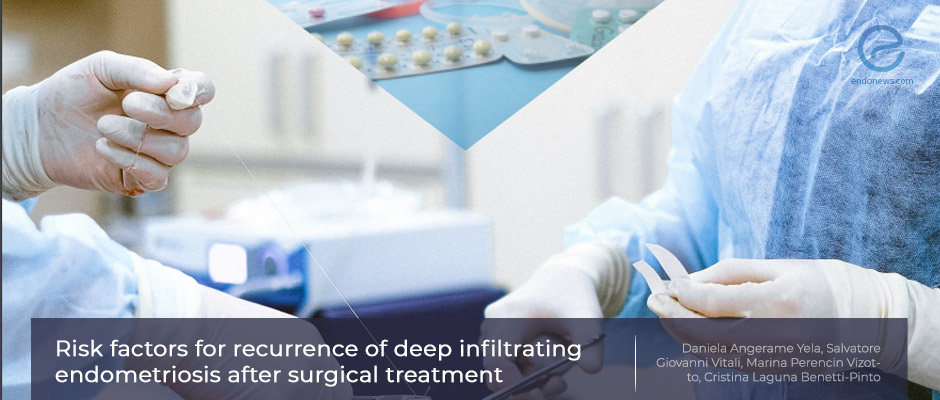Factors affecting complications and the recurrence of operated deep infiltrating endometriosis
Jul 7, 2021
Hormonal therapy: double edged sword
Key Points
Importance:
- Deep infiltrating endometriosis is the advanced stage of endometriosis that carries a great surgical risk and higher rates of surgical complications. It is important balancing the advantages and disadvantages of the type of treatment individually to improve the quality of life.
Highlights:
- The women with deep infoltrating endometriosis with intestinal tract involvement, may have higher risk of recurrence.
- Similarly, the women who don't get hormonal therapy, or those who use levonorgestrel-releasing intrauterine device after the surgery may have higher risk of recurrence.
What's done here:
- A retrospective observational cohort study was set up by Brazilian and Italian group, included 72 cases that underwent deep infiltrating endometriosis surgery.
- Postoperative complications and the risk factors that are related to the recurrence of deep infiltrating endometriosis were evaluated.
Key Results:
- Postoperative early and late surgical complications were found at 16.6% while the recurrence rate was 34.7%.
- The higher chance of surgical complications was correlated with intestinal involvement and preoperative progestin injection.
- The women who did not use the hormonal treatment after the surgery had a 5 times higher recurrence rate.
- Another risk factor for the recurrence was postoperative use of levonorgestrel-releasing intrauterine device.
Limitations:
- Retrospective nature of the study causes difficulties for robust comparative analyses.
- Long follow-up, tertiary center and operations by an expert team are the strengths.
Lay Summary
Deep infiltrating endometriosis is classified as penetrating the endometrial tissues more than 5 mm deep on the peritoneal surface, mainly uterosacral ligament, rectovaginal septum, ovarian fossa, pelvic peritoneum, bowels, ureters, and bladder. Treatment of the disease depends on the need for pain relief, fertility, and to prevent the spread of endometrial foci.
The surgical approach is the removal of endometriosis foci, and operation of the advanced stages requires highly skilled surgeons to prevent complications and lower the recurrence rate of the disease.
Yela et al from University of Campinas, Brazil, discussed the early and late complications and risk factors for recurrence of DIE in their paper that recently published in "Journal of Obstetrics Gynecologic Research".
This retrospective observational cohort study includes 72 women operated for deep infiltrating endometriosis. The hormonal therapy administered to patients before and after the surgery were within the scope of their interest besides their demographic features, pain symptoms, and fertility status. The indications for surgery were not responding to drug therapy, intestinal and/or ureteral involvement risking obstruction, and desire of pregnancy.
Twenty-six patients were treated with hormonal therapy postoperatively, and 17 patients did not have hormone prescriptions due to their pregnancy desire.
Complications were reported in one-sixth of surgeries, and recurrence of lesions in one-third.
Gastrointestinal involvement by deep infiltrating endometriosis, and the usage of intramuscular progestin before surgery were associated with a higher risk of intraoperative complications. On the other hand, higher risk of recurrence was observed among the patients who did not use hormonal treatment or used a levonorgestrel-releasing intrauterine device in postoperative period.
The authors draw attention to prescribe hormonal therapy after the surgery to reduce the recurrence risk. They also indicated not to prefer levonorgestrel-releasing intrauterine device although its beneficial effects against dysmenorrhea and chronic pelvic pain.
Research Source: https://pubmed.ncbi.nlm.nih.gov/33998109/
surgery complications high-risk hormonal treatment deep infiltarted endometriosis.

